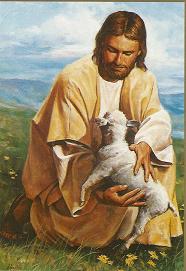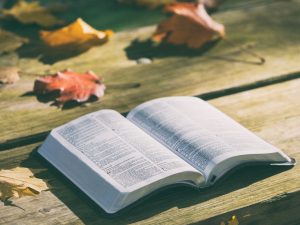Fourth Sunday of Easter.
Gospel reading: John 10:11-18
 Vs.11 Jesus said, “I am the good shepherd: the good shepherd is the one who lays down his life for his sheep.
Vs.11 Jesus said, “I am the good shepherd: the good shepherd is the one who lays down his life for his sheep.
Vs.12 The hired man, since he is not the shepherd and the sheep do not belong to him, abandons his sheep and runs away as soon as he sees a wolf coming, and then the wolf attacks and scatters the sheep;
Vs.13 this is because he is only a hired man and has no concern for his sheep.
Vs.14 I am the good shepherd, I know my own and my own know me,
Vs.15 just as the Father knows me and I know the Father; and I lay down my life for my sheep.
Vs.16 And there are other sheep I have that are not of this fold, and these I have to lead as well. They too will listen to my voice and there will be only one flock and one shepherd.
Vs.17 The Father loves me because I lay down my life in order to take it up again.
Vs.18 No one takes it from me; I lay it down of my own free will, and as it is in my power to lay it down, so it is in my power to take it up again; and this is the command I have been given by my Father.
Historical situation of Passage.
It is traditional on the 4th Sunday of Easter to reflect on Jesus the Good Shepherd as given to us in John’s Gospel, Chapter 10. Each year we look at a different section from chapter 10. In this year of Mark the extract given to us is John 10: 11-18. On this Sunday we are also invited to reflect on the exercise of leadership in our Church, society and world; and to pray for growth in appreciation of, and commitment to, vocations in the Church – Parenting, Community leaders, Missionaries, Justice and Peace activists, Teachers, Social workers, as well as Priests and Religious.
The image of the “Shepherd” and of God as the Good Shepherd goes back to the time when the Jewish people were a nomadic people shepherding sheep.
David and Joshua were considered to be good shepherds. Psalm 23:1 and Isaiah 40 refer to Yahweh as the divine shepherd of Israel, who in the last days, will shepherd the flock of his people through the Davidic Messiah (Ezekiel 34:11-24).
Where did this happen?
This happened in Jerusalem, in the Temple precincts, at the Portico of Solomon. This portico, celebrating King Solomon, was a colonnade walkway on the eastern side of the Temple.
When did this take place?
This took place in Winter time during the Feast of Dedication or Festival of Lights. This was an eight day winter festival to celebrate the rededication of the 2nd Temple during the Maccabeen Revolt in164 BC.
In the Gospel context It happened immediately after the account of the healing of the Blind Man. As is often the case in John’s Gospel Jesus is articulating his understanding of his own identity and mission.
Who was there?
Jesus and the Jewish authorities – scribes, Pharisees, elders, chief priests. The atmosphere between Jesus and Jewish authorities is already antagonistic and at worse hostile.
What happened?
Jesus is engaging with the Jewish authorities and indirectly challenging them. Jesus makes a strong and clear distinction is made between the “good shepherd” and the “hireling”. The good shepherd has a deep and intimate knowledge of the individual sheep – their stories, vulnerabilities, wounds, needs. What’s more, the good shepherd gives his life, sacrifices himself, for the well-being, safety and security of those in his care. This is how Jesus understands himself. The hireling, on the other hand, has no real concern for the sheep and is only interested in what he can get out of it for himself – prestige, status, and privileges etc. -an implicit challenge to his hearers to have a look at themselves in this regard!
In this passage we see the wonderful humility of Jesus. He acknowledges that the source of his strength comes from outside of himself.
He gives himself freely and generously without coercion to the wellbeing and fulfilment of those in his care.
His self-giving is inclusive embracing those who are considered to be outsiders and Gentiles. Jesus recognises that his own fulfilment will come through self-sacrificing love – through his own self-sacrifice he will enter into a fuller and deeper life. In giving himself away he finds himself.
Passage invites us to celebrate the “Good Shepherds” we have known and to examine our own exercise of authority.
Some Suggested Guidelines for Meditation.
Remember the Good Shepherds we have known, or have been ourselves, as parents, teachers, community leaders, Carers, Friends – people who gave of themselves totally for the well-being and happiness of others; self-giving and self-sacrifice were second nature to them – people in whom we have encountered Jesus “the Good Shepherd”.
Remember their loving identification with those in their care – The happiness of the “sheep” was their happiness. The sorrow of the “Sheep” was their sorrow.
Remember their knowledge and attentiveness to the intimate details of those in their care.
Remember their humility as they acknowledged that the source of their strength came from outside of themselves.
Remember how they gave of themselves freely and generously with a love that embraced all, not only those for whom they had immediate responsibility.
Remember how they found their joy and fulfilment in life by living their vocation to the full.
Remember “Hirelings” we have known, or have been ourselves – people in responsible positions who put self-interest before the needs and well-being of those entrusted to them.
Ø More interested in status, popularity, position and privilege..
Ø Hurried and superficial in carrying out responsibilities.
Ø Turning a blind eye to what really needs attention.
Ø indifferent to the consequences of actions on the lives of others. Lord Have Mercy